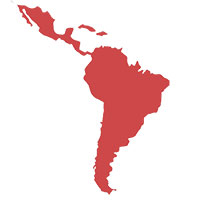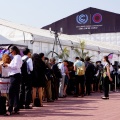What Next for Equity
Cleo Verkuijl | December 10, 2014.
Reducing global greenhouse gas emissions requires nations to share responsibilities. Countries are generally only willing to commit to changing their emissions pathways if they believe that the context they are within is fair. Yet, many aspects of climate change are inherently imbalanced.
Countries currently have very different historic and present-day responsibilities when it comes to contributions to climate change. We also know that climate change will first impact nations that have not only a limited capacity to respond, but ones that are already facing existing development questions. It’s these very vulnerable countries that have generally done the least to cause climate change.
This is why when countries talk about reducing emissions, they can’t avoid talking about equity.
Both the United Nations Framework Convention on Climate Change (1992) and its Kyoto Protocol (1997) seek to reflect equity in their provisions. They do so primarily through the principle of ‘common but differentiated responsibilities and respective capabilities’ (CBDR-RC). It acknowledges that countries have different responsibilities in areas such as emissions reductions, financing and technology transfer depending on national circumstances, historic and current emissions and development needs. Equity in climate mitigation and adaptation efforts requires some nations to contribute more than others in line with their historical responsibilities and respective capabilities.
Representatives from 195 countries are currently gathered in Lima, Peru to negotiate a climate deal that if successful will regulate international climate policy for decades to come. The stakes are very high: the agreement needs to stave off climate change and its more severe consequences, and countries need to ensure that they agree to something that is not only in their interest now, but that can also be relied upon to defend their priorities well into the future.
In negotiations towards a new agreement, set to be concluded in Paris in December 2015, equity will play a central role. But to ensure a successful outcome in Paris, parties’ highly divergent views on the topic still need to be reconciled.
As the last 25 years have shown, low emitters can become high emitters and poor countries can become richer. That’s why countries like the United States, Canada and Australia want to scrap equity language, in particular the principle of CBDR-RC. They view the concept as problematic as it has traditionally been used to keep in place a ‘firewall’ between developed and developing countries, shielding big emitters such as China, India and Brazil from having to take on binding emission reduction commitments.
For similar reasons but using a more conciliatory approach, the European Union is pushing a new agreement that reflects the dynamic nature of CBDR-RC. The most recent draft text for the Paris agreement has taken this approach on board, and refers to “evolving” CBDR-RC.
But this language has been slammed by the G77+China Group, who have warned that “any attempt to redefine, rewrite or renegotiate the (Framework) Convention will not be acceptable and will only complicate and delay the process.”
A possible compromise could be the a proposal for “concentric differentiation” recently submitted by Brazil, under which developed countries would have economy-wide absolute emissions targets; emerging economies would adopt economy-wide intensity, per capita, or business as usual deviation targets, and developing countries could take non-economy wide actions. Brazil’s proposal advances discussions as it breaks the strict partition between developed and developing countries and all countries would be encouraged to move towards economy-wide absolute targets over time.
Meanwhile, the past week has seen Bolivia pushing an elaborate but controversial top-down calculation on how the world’s remaining carbon budget could be equitably divided between parties, and the Africa Group has recently suggested parties’ nationally determined intended climate efforts, to be announced next year, be subjected to an assessment for adequacy and fairness.
As we move into more political dialogues here in Lima, it’s clear equity will remain high on the agenda.













comment